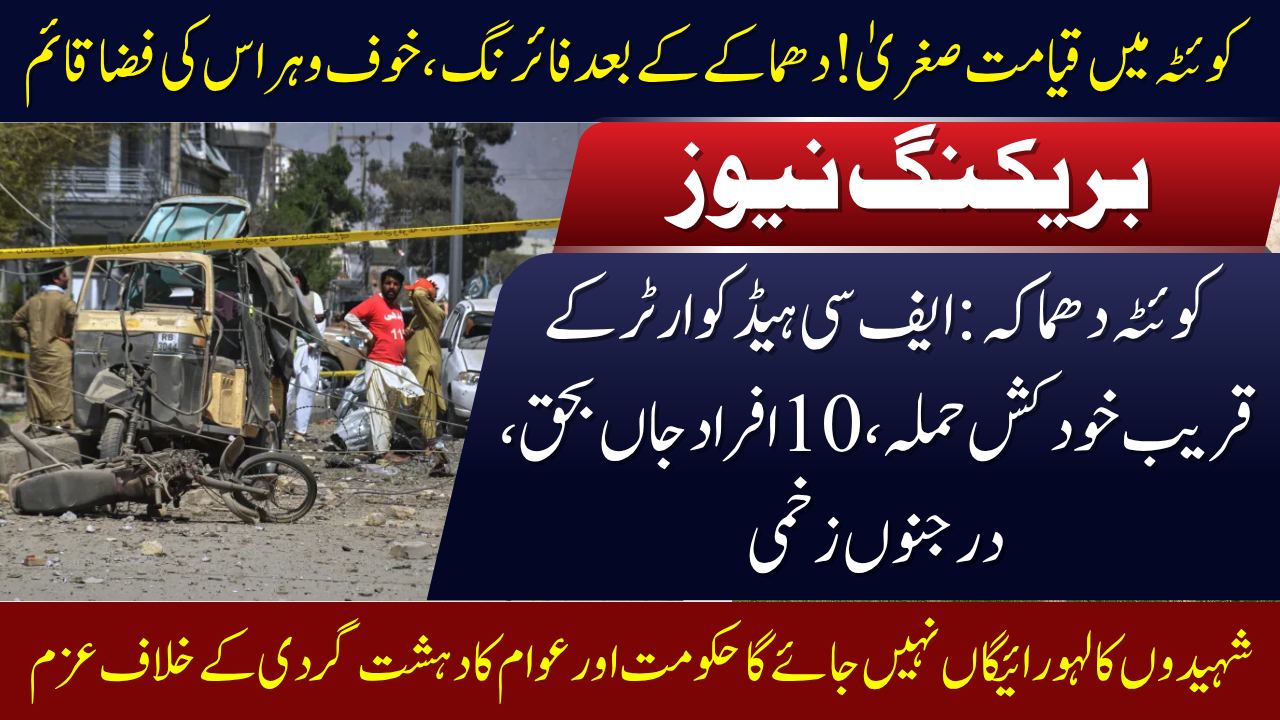Blast Near Paramilitary Headquarters
Introduction
Quetta, the capital of Balochistan, once again witnessed a tragic act of terrorism as a powerful suicide blast targeted the Frontier Corps (FC) headquarters. The devastating attack killed at least 10 people and left more than 30 others injured, creating panic across the city. The incident highlights the fragile security environment of the province and the continued threat of militant violence.
The Attack
According to security officials, the explosion occurred when a vehicle laden with explosives rammed into the entrance of the FC headquarters. Witnesses reported hearing a loud blast followed by gunfire as militants engaged security forces immediately after the detonation.
The attack was carried out in a well-coordinated manner, with multiple gunmen emerging from the vehicle and opening fire. Security personnel retaliated quickly, and in the ensuing clash, at least four attackers were neutralized.
Casualties and Damage
The blast resulted in heavy casualties, including both civilians and paramilitary personnel. Rescue teams rushed to the site, moving the injured to nearby hospitals. Many of the wounded were reported to be in critical condition.
The impact of the explosion shattered windows of nearby buildings, destroyed vehicles, and caused significant structural damage to the surrounding area. The loud explosion could be heard several kilometers away, spreading fear among residents.
Government Response
Soon after the incident, law enforcement agencies cordoned off the area and launched a search operation to trace possible facilitators. The government of Balochistan strongly condemned the attack, calling it a cowardly act aimed at destabilizing the province.
The Chief Minister of Balochistan stated that despite such acts of terrorism, the province’s development projects and the government’s determination to restore peace would not be derailed. He emphasized that the sacrifices of security forces would not go in vain.
Prime Ministerial officials also condemned the bombing, expressing grief over the loss of precious lives and directing hospitals to provide the best possible treatment to the injured.
Possible Motives and Context
While no group immediately claimed responsibility for the attack, suspicion has fallen on militant outfits and separatist groups active in Balochistan. The province has long faced insurgency-related violence, often targeting security forces, government installations, and infrastructure linked to major development projects.
Quetta, being the administrative hub of Balochistan, remains a frequent target of militants who seek to undermine state authority and spread instability. Attacks on paramilitary forces are intended not only to inflict casualties but also to send a symbolic message against security presence in the region.
Impact on the Region
This incident comes at a time when Pakistan is trying to stabilize its internal security situation while also pushing forward with large-scale development initiatives. Balochistan plays a critical role in the China-Pakistan Economic Corridor (CPEC), making it strategically vital.
Experts believe that attacks of this nature aim to discourage investment, weaken morale, and highlight vulnerabilities in security arrangements. At the same time, they serve as reminders of the sacrifices made by security forces in maintaining peace.
Public Reaction
The news of the blast sent shockwaves throughout the country, with people taking to social media to express grief and anger. Citizens demanded stronger measures to eliminate militant networks and provide safety to residents of conflict-affected regions.
Relatives of victims gathered outside hospitals, anxiously awaiting updates on their loved ones. Civil society organizations condemned the act and called for unity in the face of terrorism.
Conclusion
The suicide attack on the paramilitary headquarters in Quetta is yet another reminder of the persistent challenges Pakistan faces in its fight against terrorism. While security forces responded swiftly and managed to neutralize the attackers, the loss of innocent lives underscores the urgent need for comprehensive counter-terrorism strategies.
The courage of paramilitary personnel and the resilience of the people of Quetta stand as a testament to the determination of Pakistan to fight back against forces of terror. However, continued vigilance, intelligence sharing, and public cooperation remain vital to ensuring that such tragedies are not repeated.
